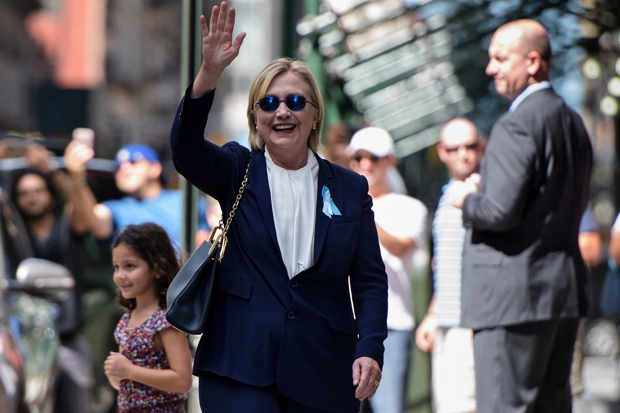If Hillary Clinton is still unwell and proceeds to the Oval Office in November, she will not be its first incumbent suffering imperfect health. She will not even be the first newly-elected president with pneumonia, nor the first requiring antihistamines to control their allergies. HRC will be merely the latest in a very long line of US presidents who were much less healthy than they liked to let on.
You might not even recall the first US president with pneumonia, because it killed him so very rapidly. That was William Henry Harrison, who had difficulty adjusting to the hectic pace of the White House after his election in 1841. Just six days in he wrote: ‘I am so much harassed by the multitude that call upon me that I can give no proper attention to any business of my own.’ Poor Harrison never did find time to rest, and death from pneumonia brought his Presidency – the shortest ever – to an end after thirty days.
Secretary Clinton’s doctors will, no doubt, be prescribing more effective treatments than those President Harrison received (opium and leeches). Yet commentators are focusing on Clinton’s health precisely because US presidents have historically been such a very unhealthy lot. In the twentieth century alone, Woodrow Wilson was partially paralysed and blinded by a stroke which left him secluded and inactive in the Oval Office for the last eighteen months of his presidency. And less than a year after taking office, the pace of Calvin Coolidge’s presidency fell radically after his teenage son died of blood poisoning, the result of an untreated blister incurred while playing tennis. The previously energetic Coolidge began sleeping ten hours a day and eating incessantly, shrinking his work day to just four hours.
And had World War II not been raging at the time, it seems unlikely that Franklin D. Roosevelt, stricken by muscle-wasting and heart disease, would have chosen to run for a fourth term in office. One of his doctors, Frank Lahey of Boston, had written in 1944 to warn that he was highly likely to die in office during his fourth term – which he proceeded to do, less than a year later in April 1945.
By the 1950s, details of previous presidents’ health issues had started to come to light, prompting President Eisenhower to be rather more open about his own heart attack – but not so open that he shared his doctors’ highly negative prognosis with the public prior to seeking his second term.
Yet the greatest medical sleight of hand of all US presidents was undoubtedly achieved by John F Kennedy. Only in the last fifteen years have historians begun to understand quite how unwell the ‘youthful, energetic’ JFK really was, almost from birth. The young JFK contracted scarlet fever, suffered from Addison’s Disease, and was nearly crippled by his degenerative back problems, compounded by his doctors overprescribing steroids to treat it. Between May 1955 and October 1957 alone, Kennedy was hospitalised nine times, spending 45 days in hospital. And by the time of the Cuban Missile Crisis in 1962, Kennedy was taking a vast pharmacopeia of medications: pain relievers for his failed back surgery, anti-spasmoditics for colitis; antibiotics for urinary tract infections and – like Hillary – antihistamines for his allergies. JFK was also allegedly regularly injected with methamphetamines by a New York ‘Doctor Feelgood’, including prior to key meetings with Khrushchev. And as he was driven through Dallas on November 22, 1963, Kennedy was as usual wearing a spinal brace. This had the highly undesirable effect of preventing him recoiling even after Oswald’s first bullet struck his neck. Instead JFK remained stiffly upright, held as a steady target for the second, fatal shot to his head.
US presidential elections, especially modern ones, are utterly gruelling affairs for the candidates. Unlike the UK, the country cannot be covered by easy day trips in helicopters – instead, an endless stream of trains, planes and cars is required. JFK was said to be rendered so exhausted by winning the presidency that he was practically catatonic and unable to focus on work even two weeks later. So, one should feel sympathetic to Mrs Clinton and Mr Trump, and their medical and PR teams, as they cover the vast ground between now and November. It may also be inevitable that America will elect yet another unhealthy president.







Comments